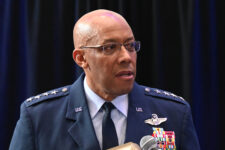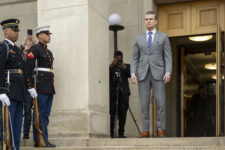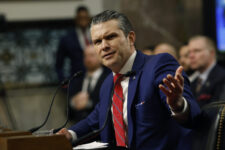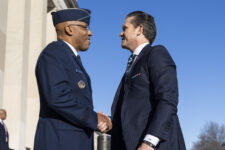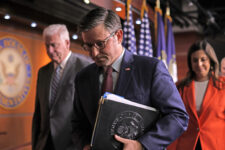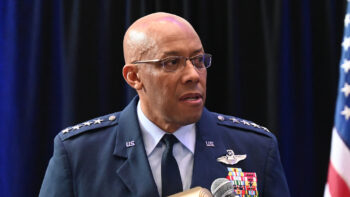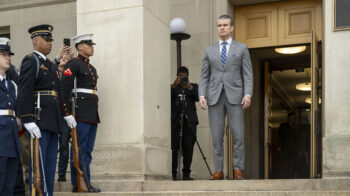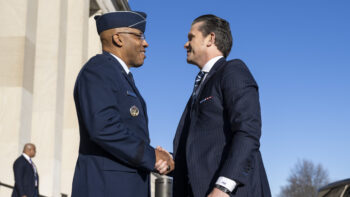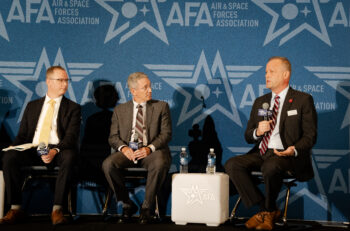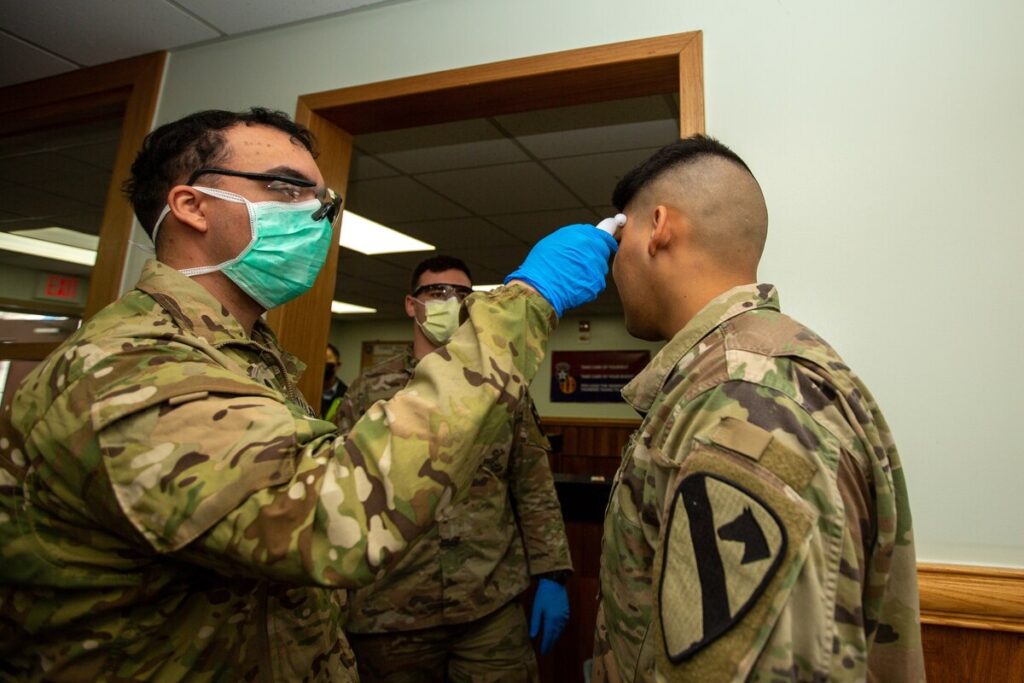
Army soldiers conduct COVID-19 coronavirus testing
It should surprise no one that a sense of pessimism has come to dominate American public opinion. A grueling year has intensified an overall downturn in attitudes across the board – but the most troubling manifestation of this trend is the decline in Americans’ trust and confidence in the U.S. military.
For several decades, the military had been immune to the trend of steadily declining trust in American institutions. According to the Ronald Reagan Institute’s latest National Defense Survey, that is no longer the case. The number of Americans who say they have a great deal of confidence in the military has fallen by 14 percentage points over the past three years. Strikingly, trust in the military has diminished across all major demographics—age, gender, party affiliation—by double digits since 2018.
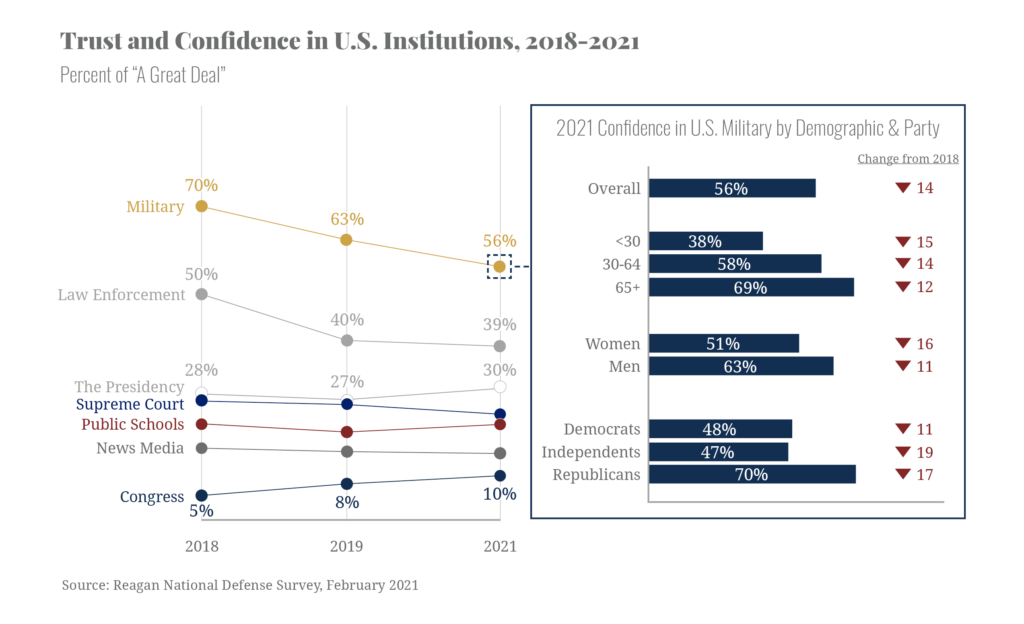
SOURCE: Ronald Reagan Foundation and Institute. NOTE: The 2021 survey was originally scheduled for December 2020; no survey was conducted in 2020.
Despite what some may think, this cannot be solely attributed to the events of 2020 and early 2021. (The poll was conducted Feb. 4-14th, having been delayed from December 2020). While the military has suffered a seven-point drop in confidence since 2019, there was an equal seven-point decline in the year before that. Over the same period, most other institutions in our survey—including Congress, the presidency, the Supreme Court, the media, and public schools—experienced relatively stable levels of trust.
There are numerous possible explanations for this decline in confidence, some of which other results from this survey suggest. For example, almost half of Americans think the wars in Iraq and Afghanistan have, for the most part, been a failure. One might speculate that other factors could include the politicization of the military or the growing awareness surrounding the issue of sexual assault in the armed forces. Recent headlines about extremism in the ranks and the unacceptable number of active and retired servicemembers involved in the January 6th attacks may have contributed as well.
Declining confidence in the military is also borne out by other findings from this annual national public opinion poll that pulses views on defense issues. Only slightly over half of Americans think that the United States has the best military in the world, and an even slimmer majority think we would win a war against a nuclear power.
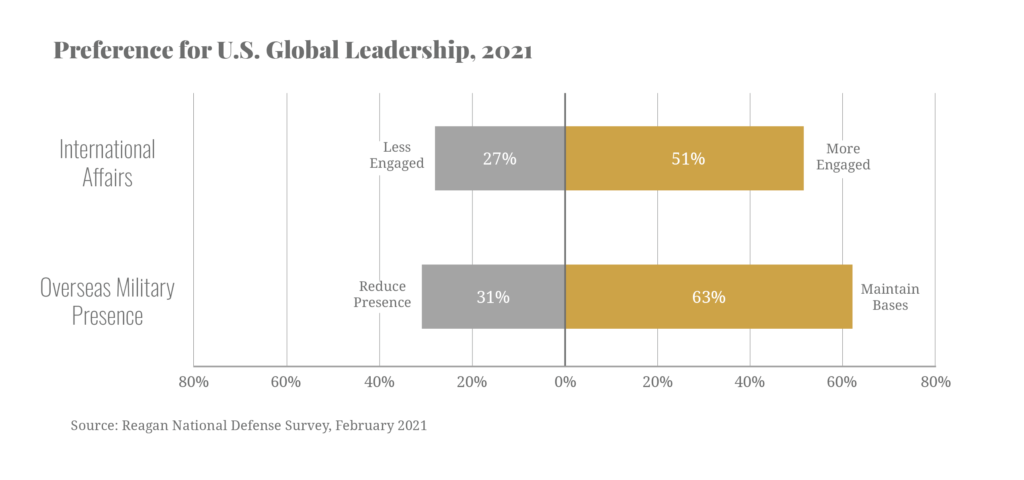
SOURCE: Ronald Reagan Foundation and Institute
It would be a mistake, however, to conclude that the results of this survey indicate a reluctance on behalf of the American people to take an active role in global affairs, including using the military when necessary. In fact, support for American leadership in the world consistent with President Reagan’s “peace through strength” philosophy remains strong. Americans want the United States to be more engaged—not less—in international events. That belief also resonates across all demographic groups, including party identification.
Three in four Americans, including significant majorities of both Republicans and Democrats, favor increasing defense spending. When asked if the United States should maintain military bases around the world or reduce our military presence overseas, nearly two in three Americans prefer the former—also with strong bipartisan support. And when asked if the United States uses the military in too many situations where diplomacy would be better, only one in three Americans said yes. A plurality believe we strike the right balance between using the military and diplomacy, rather than relying too much on one or the other.
American perception of the military is nuanced, and declining trust in that institution may not necessarily be a sign of waning public legitimacy. It’s worth noting that, despite the decline in confidence our survey reveals, the military remains the most trusted institution in America by a large margin. The trend nonetheless may be a leading indicator of a diminishing national spirit.
 Yet, Americans have overcome bouts of pessimism before. When President Reagan took office exactly 40 years ago, one of his top priorities was to restore confidence in a military still struggling in the aftermath of Vietnam. It was part of President Reagan’s broader goal of restoring national pride. He recognized that a trusted military not only strengthens deterrence; it strengthens the self-confidence of the American people. As President Reagan explained in his Farewell Address, “As long as we remember our first principles and believe in ourselves, the future will always be ours.”
Yet, Americans have overcome bouts of pessimism before. When President Reagan took office exactly 40 years ago, one of his top priorities was to restore confidence in a military still struggling in the aftermath of Vietnam. It was part of President Reagan’s broader goal of restoring national pride. He recognized that a trusted military not only strengthens deterrence; it strengthens the self-confidence of the American people. As President Reagan explained in his Farewell Address, “As long as we remember our first principles and believe in ourselves, the future will always be ours.”
Roger Zakheim is the Director of the Ronald Reagan Institute. Rachel Hoff is the Institute’s Policy Director.
Hegseth fires Navy’s top officer, Air Force No. 2
The firings of Adm. Lisa Franchetti and Gen. James Slife follows tonight’s removal of Gen. CQ Brown as chairman of the Joint Chiefs of Staff.

